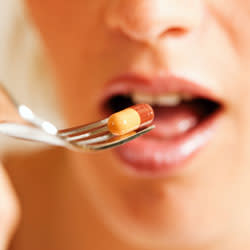Go easy on the vitamin supplements

© Thinkstock
Vitamins have a good reputation: anti-fatigue and antioxidant… So, you could be tempted to boost the supply you are getting by using dietary supplements, widely available and with alluring promises (anti-ageing, energy boosting…).
But in results from current studies, scientists are less and less in favour of the use of supplements, even less so when there is no real reason for deficiency in the first place.
Vitamins… getting too much of a good thing
For some vitamins; A, D, E, PP, B6, B9 and C, there are set limits on intakes for safety reasons. In this way, while the RDA for vitamin A is 600 to 800 mg, the toxic effects it might have (such as encouraging congenital deformities) are estimated to occur after a dose of 3000 mg or more.
Another example is for instance, liver (the food with the highest concentration of vitamin A), which is advised against for pregnant women. Experts have found that in addition to a varied diet, dietary supplements or even very vitamin-rich foods (such as liver or Vitamin A for pregnant women) can lead to higher doses of nutrients than is safe.
Numerous epidemiological studies have observed the preventative effect antioxidants (beta-carotene, vitamins E and C…) or vitamin B9 (folic acid) have for cardio-vascular diseases and/or some cancers. Scientists thus began intervention studies where volunteers took vitamin supplements while their state of health was observed long term.
Some of these studies brought up some nasty surprises: in the 1990s, studies had to be interrupted because of the sharp development of lung cancer in smokers receiving beta-carotene. A meta-analysis (compilation of studies) in 2005 showed that there was an increased risk of mortality after an increased consumption of vitamin E. Finally, very recent tests have been carried out on the effects of vitamin B9 dietary supplements which have shown an increased risk of breast cancer, colon cancer, lung cancer and cancer of the prostate.
On the one hand, researchers have concluded that dietary supplements (in reasonable doses) are beneficial for health in the case of initial deficiencies. On the other hand, supplements can also prove to be dangerous for the health of people who don’t actually have any deficiencies.
So the adage that “prevention is better than cure” may not really apply to vitamin supplements after all…
Florence Daine
More information:
Can you take too many vitamins and minerals?
Vitamin supplement chart
Nutrition discussions


